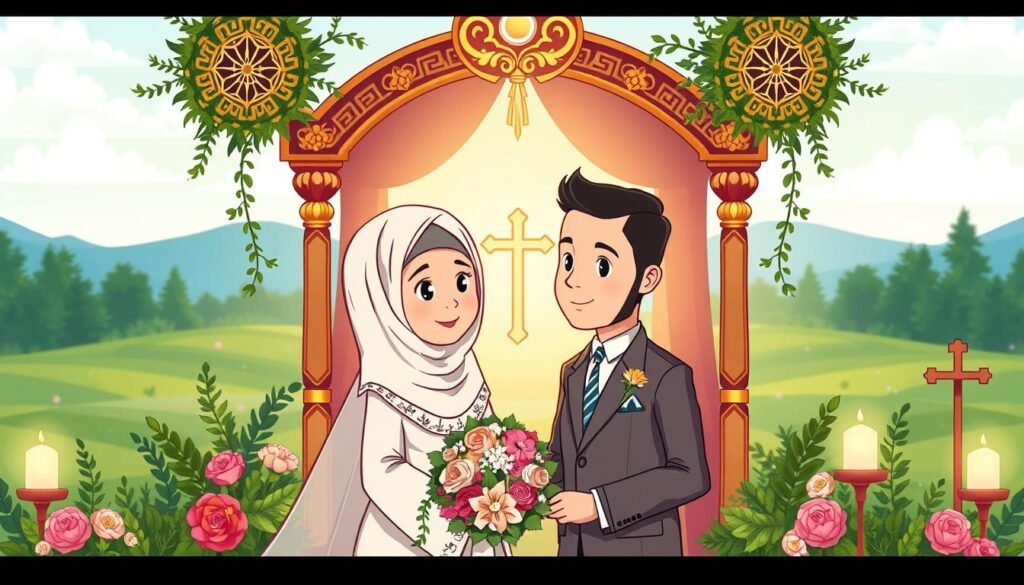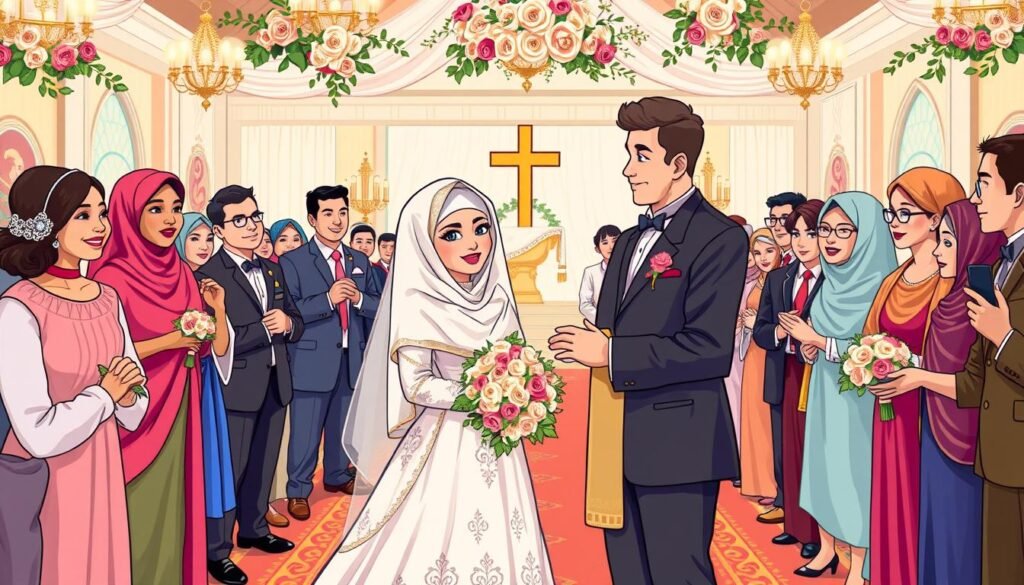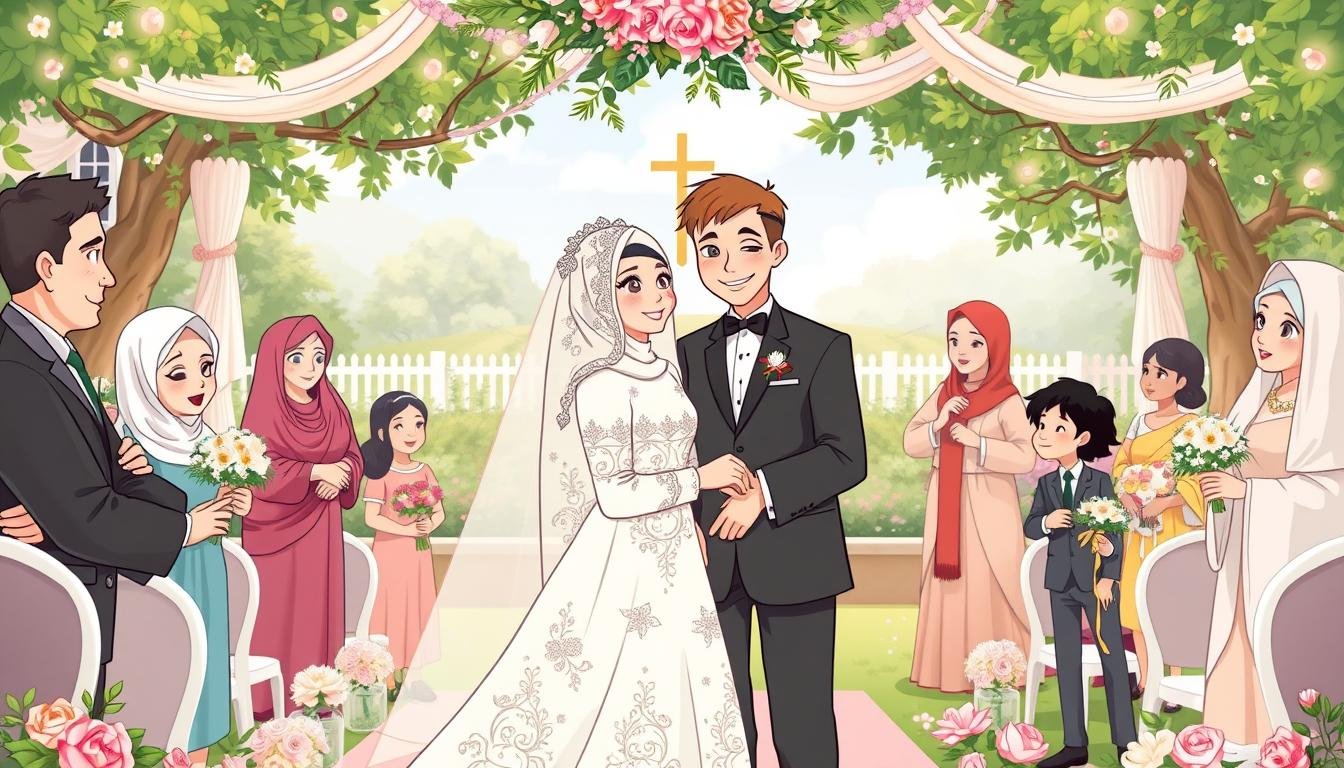Interfaith marriages are becoming more common in our world. I often wonder if a Muslim can marry a Catholic without giving up their beliefs. This question makes us think about the challenges of mixing two different faiths.
It’s important to know that laws about Muslim and Catholic marriages can be different. These laws affect both partners, like how they raise kids and deal with family expectations.
In this article, we’ll look at the complex issues in interfaith marriage. We’ll see how Islamic and Catholic views can help bridge cultural gaps. We’ll also talk about the legal and historical sides of Muslim and Catholic marriages.
Along the way, we’ll explore the hopes and worries that come with these marriages. It’s a journey into understanding and acceptance.
Understanding Interfaith Marriages
Interfaith marriages are complex, where one partner has a different religion. This brings tough cultural considerations that couples must face together. In places like Canada and the United States, many people are in these marriages.
Recently, more Muslim men are marrying women who don’t follow Islam. This change makes people rethink old marriage requirements.
The Qur’an lets Muslim men marry Jewish or Christian women. But, it limits Muslim women from marrying outside their faith. Scholars in Western countries are now performing interfaith marriages with Muslim women, even though it’s not allowed traditionally.
This change affects family life and how children are raised. A Muslim man marrying a Jewish or Christian woman might face issues. He’s expected to raise their kids as Muslims, which could cause tension.
Some non-Muslim partners might choose to convert to Islam. But, this choice is often tied to their cultural ties.
Islamic law and modern views on interfaith unions are different. The rules seem to clash with the Qur’an’s message of acceptance. As views on interfaith marriages evolve, there’s a growing need for understanding and respect for different beliefs.
Couples in these marriages must talk openly about their beliefs and values. This way, they can fully accept their relationship. For more on Muslim views on dating outside their faith, check out this article.
The Perspective of Islamic Law
Islamic law has clear rules for interfaith marriage. It has different rules for Muslim men and women. Muslim men can marry women from the “People of the Book,” like Christians.
But, Muslim women can’t marry non-Muslim men. These rules come from the Quran, which values faith in relationships.
Interpreting these rules can be complex. Scholars have different views based on culture and family. Islamic law aims to keep faith and values in families.
This view shapes how communities see interfaith marriages. There’s a push to mix old teachings with today’s values. This shows the importance of finding a balance.
Can A Muslim Marry A Catholic
Interfaith marriages mix faith, culture, and personal choices. For Muslim-Catholic marriages, knowing the legal rules is key. It’s important to respect both faiths as couples start their life together.
Legal Framework for Muslims Marrying Christians
Legal rules say Muslim-Catholic marriages are okay if certain rules are followed. A Catholic marrying a Muslim might need a Church dispensation. This means they promise to follow some religious rules.
They might promise to raise kids as Catholics and respect the Church’s views on marriage.
About 50% of interfaith marriages face problems because of religious differences. These issues can affect making decisions and raising kids. It’s vital for couples to talk openly about their faiths. This way, they can build a strong relationship and handle the challenges of a Muslim-Catholic marriage.

Conditions for Catholic and Muslim Marriages
Catholic and Muslim marriages have different rules and beliefs. In Catholic interfaith marriage, the church wants couples to commit to their faith. They expect children to grow up Catholic, showing the importance of faith in the family.
Catholic Requirements for Interfaith Marriage
To marry in the Catholic Church, couples face strict rules. They need a special permission from their bishop. This ensures they understand their faith and how it will shape their family’s beliefs.
Islamic Perspective on Raising Children
In Islam, raising children is very important, even in interfaith marriages. Muslim men can marry Christian women, but children must be raised Muslim. This can cause tension, as it goes against the Catholic way of raising children. Couples must talk and agree on how to raise their kids.
Historical Context of Muslim and Catholic Marriages
The history of Muslim and Catholic marriages is complex. It shows centuries of both cooperation and conflict. This history helps us understand today’s interfaith relationships.
The Ashtiname of Muhammad is a key document. It allowed Christians to live peacefully in Islamic lands. This treaty shows how respect can lead to successful interfaith marriages.
Today, couples use this history to build their own unique partnerships. They aim to honor their traditions while sharing their journey together. This understanding helps foster empathy and deeper connections in Muslim-Catholic unions.
Modern Practices of Interfaith Marriages
In today’s world, more people from different beliefs are getting married. This is true for Muslim and Christian couples. They show that love can cross faith lines.
Trends in Interfaith Marriage in the US
About 10% of married Muslims in the US have non-Muslim partners. This shows a big change in how people view these marriages. These unions show that love can be stronger than religious differences.
But, raising kids in these families can be tough. Kids might wonder about their faith. This can be a big challenge for families.
When talking about Muslim and Christian marriages, we must think about both sides. The Quran says Muslim men can marry certain women. But, this choice is often questioned by society.
There can be disagreements about how to practice their faith. This can lead to tension, as both sides have their own expectations.

Even with these problems, many couples stay strong. They want to build a united family. Leaders from both faiths say talking and respecting each other is key.
As time goes on, more people are open to interfaith marriages. This could lead to more understanding and acceptance in the US.
Cultural Challenges in Interfaith Marriages
Cultural challenges are big in interfaith relationships, like those between Muslims and Catholics. When couples mix different cultures, they face many values and traditions. This can cause tension in their families.
They try to respect each other’s customs but also keep their relationship strong. Families and communities can make things worse. This leads to feelings of being alone that many couples feel.
Interfaith couples struggle to keep their own identities while pleasing their families. For example, many Muslim immigrants worry about their kids marrying outside their faith. They fear losing their culture and faith.
It’s key to talk openly about these challenges, like how to raise kids in such complex situations. About 67% of interfaith marriages have problems with parenting and religion. Talking about shared values and faith can help.
Parental and Community Influences
When thinking about interfaith marriages, the role of parents and community is huge. Many Muslim parents fear their kids dating people from other faiths. They worry about losing their children’s religious and cultural roots.
They fear for their grandchildren’s upbringing. They wonder if they will keep Islamic values alive. This worry is heavy on their minds.
These worries show how society affects our choices. The need to follow Islamic teachings can make people hesitant about interfaith relationships. Parents dream of a family united by faith.
Talking openly about these issues can help. It can lead to understanding and acceptance. This way, families can face the challenges of love across different faiths.
Fears and Concerns of Muslim Parents
Parents have many fears about interfaith marriages. They want to respect their children’s choices but worry about the outcomes. Parental influences often mean wanting to keep the family’s faith strong.
They talk about how to keep faith alive in a diverse world. These talks can help families find a balance between tradition and today’s world. They can face their fears with love and understanding.
The Role of Reformist Views in Interfaith Marriages
Reformist views in Islam are changing how we see interfaith marriages. They push us toward accepting more diverse unions. This new understanding says marriage should be based on love, respect, and understanding, not just rules.
As someone who knows Islamic tradition and today’s world, I see the importance of focusing on shared values. This helps us talk about interfaith marriages in a positive way.
Scholars and activists for inclusive Islam have started important talks about interfaith couples’ rights and duties. They say couples should talk about their cultures and beliefs. This helps interfaith relationships grow strong.
This talk is not just about different faiths. It also makes us see family and community in a new light.
In the U.S., with more people marrying across faiths, we have a chance to make society more open. Reformist views help us see interfaith marriages as a beautiful mix of cultures and love.
FAQ
Can a Muslim man marry a Catholic woman?
Are there specific requirements for a Catholic to marry a Muslim?
What challenges do interfaith couples often face?
How does Islamic law approach interfaith marriages?
What are the implications of raising children in an interfaith marriage?
What is the historical context of Muslim-Catholic marriages?
How prevalent are interfaith marriages in contemporary society?
How can parents influence interfaith marriages?
What role do reformist views play in interfaith marriages?

Embracing Faith, One Insight at a Time!
The teachings of the Quran have always guided my path. With a deep passion for Islamic knowledge, I strive to blend the wisdom of tradition with the relevance of today, making the timeless messages of Islam accessible and meaningful for everyone.
Muslim Culture Hub is my platform to share historical insights and thought-provoking articles, exploring both well-known and lesser-discussed aspects of Islamic culture and beliefs. My mission is to create an inclusive online space where everyone can learn, strengthen their faith, and connect with the profound message of Islam.
Join the journey!
May peace be upon you.









